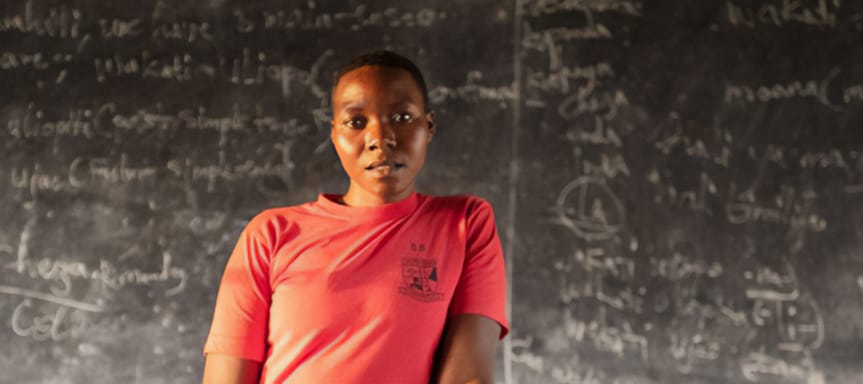
Venancia doesn’t know when the violence began.
“There has been war ever since I was born,” said the 18-year-old who grew up in the Democratic Republic of Congo (DRC.)
Even with unrest around her, she was an eager student who loved to study and play soccer with her friends. By all accounts, Venancia was on her way to a bright future.
It was during one of those soccer games with friends that a bullet came out of nowhere, not even aimed for her, and hit Venancia in the leg. At the sound of the gunfire, everyone scattered for safety, but Venancia was unable to move.
She remained where she fell, crumpled alone in the middle of the soccer field and holding her shattered leg in agony, for more than seven hours.
By the time a family member found Venancia and rushed her to the hospital, there was nothing doctors could do to save her leg–they were forced to amputate.
Born into circumstances beyond her control, Venancia had found a safe haven in school, a beautiful world where the outside chaos couldn’t touch her.
Recovering from the accident kept her away from that safe haven for two years, and she was far behind her former classmates when she was able to enroll in school again.
“It was a nightmare,” Venancia remembers. “But, I was more determined than ever to finish my studies. I know that finishing school means my life will be better. I will be able to find a job and support myself.”
Eventually, one after the other, she lost all five of her siblings to the violence.
“My mom finally decided that if we wanted to live, we would have to leave. We left DRC on foot and walked for over a week,” Venancia says.
For Venancia, walking meant hobbling on crutches.
And the escape meant that Venancia put her studies on pause—again. Life had to start over completely for the small family and Venancia’s future seemed forever at the mercy of forces outside of her control.
When they arrived in Uganda, the refugee mother and daughter were provided food rations, a small plot of land, and a tarp. Venancia’s resourceful mother made the one-month rations stretch over a few months until the small garden they planted on their plot of land started providing produce to eat.
The tent they crafted from the tarp became their home for the next few years.
Venancia missed yet another year of school as she adjusted to life in a refugee settlement. When she returned to the classroom, once again she was older than everyone else in her class. And now she also faced a language barrier. She spoke French, but her new classes were conducted in English.
“I didn’t mind that I couldn’t understand anything at first,” she says. “I knew that in time I would learn English, too. I would rather struggle with a new language than go back home and risk my life.”
Imagine the strength it requires to keep holding onto your dreams while experiencing the life that Venancia has lived. The young woman has met every setback with grace and grit. This includes the death of her mother, which left Venancia completely alone.
School has become more than a safe haven for Venancia–it is now her home as well.
Her classmates are her family. Education is what she has left. It is the key to her survival.
“If it weren’t for school, I wouldn’t have anyone. I’d be living in a small house without my mother,” Venancia says. “Education is important because I can empower myself. I want to be a doctor when I grow up. I want to help refugees and disabled people like me.”